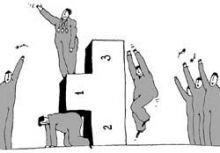The widespread opinion that financial-industrial groups (FIGs) no longer wield influence in Ukraine must be significantly revised. After all, just like in the past, big business continues to define the image of the most powerful industrial sectors in Ukraine: ferrous and nonferrous metallurgy, and heavy and light industries. The wellbeing of individual cities, and the entire country, depends on the performance of FIGs, because to date no other great source of revenues has been found. Consulting Center Ltd. director Dmytro Kasyanov believes that it is crucial to understand how the role of FIGs is changing at a time when the political elites are changing, and how FIGs influence the country, each another, and society as a whole. He also believes it is necessary to draw the attention of FIGs to issues of social responsibility.
However, while most surveys aimed at gauging the influence of one structure or another circulate opinions polls among ordinary Ukrainians, this is not the case with FIGs: Ukrainians are simply not aware of their existence, even though many have heard their corporate names and the names of their CEOs. Accordingly, sociologists conducting the survey had to forsake quantitative polling in favor of a qualitative approach, posing their questions to individuals who are in the know a priori, i.e., political and economic analysts and experts associated with the most popular business periodicals. They were selected by analyzing the mass media, which involved searching for the most frequently mentioned names and using their colleagues’ suggestions and references. As a result of this sampling procedure, only 20 experts on FIGs were selected. However, according to Kostiantyn Korzh, director of the Sociological Studies Center at Taras Shevchenko Kyiv National University, this sample is sufficient to adequately evaluate the situation.
As was to be expected, FIGs that are more closely connected to the political elite have a stronger influence on the country’s economy. The only exception is Rinat Akhmetov of System Capital Management. Experts agree that this company was the most influential group under the previous Ukrainian leadership and still has no equal under the present leadership. The change of power influenced other groups, however. The influence of Viktor Pinchuk’s group, Interpipe, has diminished significantly, much like that of the group controlled by Hryhoriy Surkis. Meanwhile, the group controlled by Petro Poroshenko, former head of the National Security and Defense Council and member of the People’s Union Our Ukraine, and the Privat group, whose head Ihor Kolomoysky has been linked to Yulia Tymoshenko, have boosted their influence. Notably, experts claim that the latter two groups are actively using unofficial lobbying methods to advance their own interests. The Industrial Union of the Donbas and Interpipe use such methods less actively, which is no wonder, since their access to the levers of power has been somewhat restricted. Meanwhile, experts have identified Finances and Credit as a group that uses mostly legitimate methods in its operations.
Relations with the government were not the only issue analyzed by the experts. They named Privat as the most conflict-prone group that is not likely to make concessions and reach settlements with other leading Ukrainian FIGs. Suffice it to mention its conflicts with the Nikopol Ferroalloys Plant and its dispute over regional power distribution companies, or oblenergos, with the group of Kostiantyn Hryhoryshyn, which is known as the second most conflict-prone FIG. The Industrial Union of the Donbas has been identified as a group that is most likely to reach compromises. Experts believe that it readily and calmly enters into negotiations with other FIGs. As Korzh pointed out, proximity to power creates an illusion of impunity, when a group proceeds exclusively from its own interests. Apart from tendency toward conflict, this viewpoint reflects the extent to which a group’s actions are constructive or destructive with respect to itself, the state, and society. Most constructive in all respects is the businessman Taruta, who avoids conflicts, whereas the most destructive with respect to the state and society are Privat, Hryhoryshyn’s Energy Standards, and Poroshenko’s Ukrprominvest.
Experts say that, unlike Taruta, Hryhoryshyn is investing virtually nothing in the modernization of his production facilities. However, while modernization is exclusively his own affair, environmental issues concern the entire country. The unfortunate fact is that none of the major businessmen are worrying about the environment. Luckily, they still pay some degree of attention to the development of culture and education in Ukraine. In this sphere Interpipe has a commanding lead, while Privat is once again an outsider. It is worth noting that the negative ratings topped by Kolomoysky’s Privat group include maximizing profits while ignoring workers’ interests and the needs of the region. Moreover, this group tops the cumulative index of destructiveness, which reflects the extent to which any particular group benefits society.
Experts compiled this index by summing up the above-mentioned characteristics, singling out 22 indicators, and evaluating all groups based on this scale. The Industrial Group of the Donbas tops the index of groups that take into account society’s interests, modernize production facilities, and invest in the environment and culture. Privat has been recognized as a group that is doing exactly the opposite.
However, no matter what experts have to say about politics, all of these indexes and evaluations of big businessmen primarily reflect the following trend: the more any particular FIG needs power, the more it will do to prove its usefulness and capability. Once it obtains power, promises are soon forgotten. Isn’t the same thing happening in the top echelons of power? So why should things be any different in the top echelons of business?







